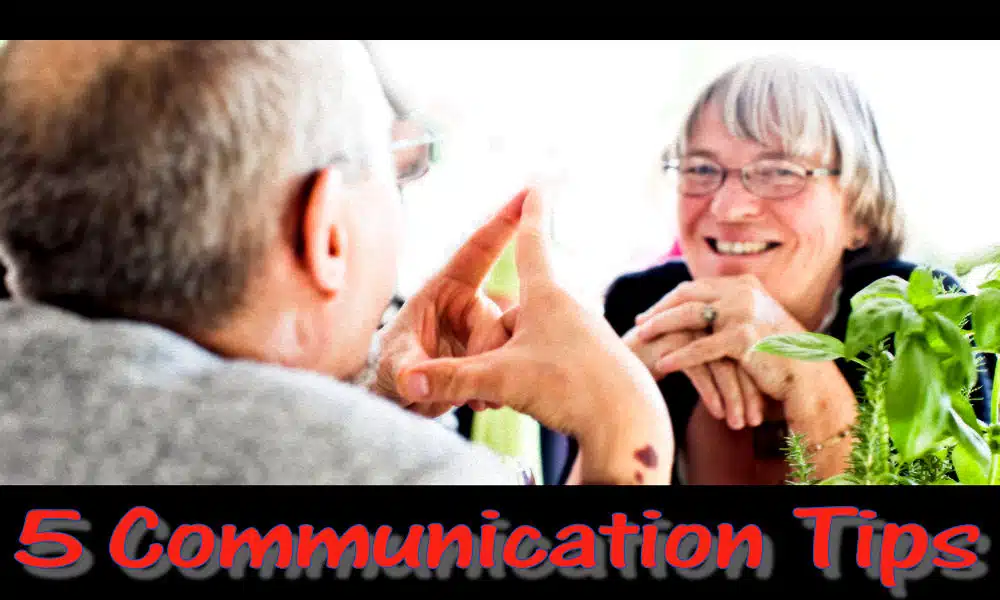5 Communication tips — when couples have issues, the reason, almost 100% of the time, is lousy communication. Here are 5 communication tips, but also have a look at my book The. Best. Relationship. Ever.

Want to learn more about living a full and meaningful life?
Want to have the best relationship ever?
Check out my books

Virtually all “couple issues” are communication issues. Superficially, the topic may be finances, sex, child-rearing, or whatever, but underlying it all is the quality and regularity of the couple’s communication. Let’s look at a few things that might help you improve in this area.
By the way, if you haven’t downloaded our two free booklets on Relationships, you obviously haven’t been exploring our website. Here’s a link to our freebies page.
1. Start Now — at least 20 Minutes a Day
Man, have I ever heard a ton of excuses for not communicating. Usually, a variant of “Don’t you know how busy I am (life is)?” Then I’d get the run-down about how tough things are at work, how the kids are in 20 activities each, and how making 20 minutes a day for one’s partner / spouse was impossible.

What’s really being said? “I don’t want to have to put in any effort at all in my relationship. It should ‘just work.’ ”
And how’s that working for you?
Most folk have this odd dream that being with the ‘right person’ means, “Now I can relax, and everything will work out just fine.”
Since this never happens, the silly and dumb among us think something’s wrong with their partner.
Communication is a skill. It’s like learning a foreign language, as no one is a born communicator.
Occasionally people think Darbella and I are ‘naturals’ at it, and blow me off on that basis. The truth is, we have made clear communication a top priority, and we don’t allow mistakes to stand.
Take away point: Start today. Sit down with your partner, and establish some ground rules.
1) Frequency (no excuses) of at least 20 minutes per day.
2) Sharing: how (including using a timer) you are going to split the time
3) No interruption rule. Communication requires listening, not defending your position.
2. No excuses
This follows from point 1.
You must drop the idea that being in relationship is, or is supposed to be, easy.
Sadly, most people haven’t read my book, Find Your Perfect Partner, and thus are in relationship with someone likely from one of the further rather than nearer planets. Despite this, (which you set in motion…) excuses are going to get you nowhere.
Busyness: yeah, right. There’s a gun pressed to your head, forcing you to say ‘yes’ to everything. Since when is saying ‘yes’ to everything a clever strategy? And if this was so, how come you’re not saying ‘yes’ to deep, intimate conversation with your partner?
Boredom: I suspect most of my clients find their partners to be boring and uninteresting. (And, of course, they’re too chicken to say “I’m boring myself in this relationship…”) There is so much eye-rolling and talking over, so much walking away, and fighting. This is a variation of “I’m in relationship with the wrong person!” Our advice: leave, or get interested!
Take away point: Many are the excuses for staying stuck and simply complaining and blaming. Excuses are the creation of lazy minds. If you seem to have little time, have a conversation about how this keeps happening, and work with your partner on learning to say ‘no.’ If you’re bored, tell your partner how you are boring yourself (hint: it’s never about your partner) and suggest specific ways to do something interesting.
3. Use “I” language
I listen to couples talk, all the time, and with poorly functioning couples, the pronoun most used is 2nd person — a form of ‘you.’ The main uses are to blame and to psychoanalyze.
Again, this is the result of laziness and a decided lack of self-responsibility.
Judgements (blame) are always about pointing the finger at others. You did this, you did that. See how badly you treat me. And then, a sitting back, arms crossed, and an expectation that one’s partner will change.
How rude.
The odd piece for me is that such blaming/demanding is always one sided. Each partner doing this expects the other to do what they are told. Yet, when the partner tosses out their list, the reaction is, “How dare you tell me what to do!”
Instead, shift the pronoun to ‘I’ — “I am uncomfortable with our level of communication, and here is what I am going to do about it.” “I am sad that (whatever) is happening, and here is what I will do to change this.”
Take away point: “You” language feeds into the problems mentioned above.
“You” language maintains the status quo, sets up power struggles, and places responsibility for change on the other person.
“I” language is self-responsible language, and when followed through with, leads to change.
4. It’s almost never about what you think it’s about
The main reason for a good communication style is that you can talk about what’s really up for you. Sadly, most people fear the ‘big’ issues, so they talk symbolically.
“If you loved me, you’d spend less time at work.” Maybe the person really is camping out at work, but almost always the real dilemma is this: “I am making myself feel distant from you. I think I’ve been abandoned, and I’m missing you, and I fear you no longer love me.” Notice that the first statement is about ‘stuff,’ and the second cuts to the heart of the matter.
Now, re-read the second statement. Given the “I” language, the sentence really says, “Here is the story I am telling myself.” There is no blame, no demand, just a clear statement of “Here is me, right now.” Note: “I fear that you do not love me” is different than “You don’t love me.”” The first is self-responsible and about the speaker. The second is blaming and mind-reading.
Take away point: Ask yourself what you are really upsetting yourself about, and talk about that, using “I” language.
If you are on the receiving end of an honest, “I” centered statement, thank your partner for sharing, and ask, “Is there anything I can do?” The authentic reply: “Yes, here is what you can do right now.”
5. Curiosity trumps ‘knowing’
No, you don’t know what’s up for your partner. Once you truly grasp this, you’ll stop second-guessing and start asking.
In the above scenario, the “Is there anything I can do?” question is also a “Is there anything I can do right now?” question. You can’t fix the past, and you can’t fix the future. You can do ‘right now,’ as that’s all there is.
The ‘communication key,’ if there is one, is to stay in the now. Here is what’s up for me, right now. here is what I want, right now. Here is what I hear, right now.
Once you get the hang of this understanding, you will also get that guilt and blaming is always about lists of past events, to which the present event is precariously attached. Again: it is impossible to fix old stuff. You can only work, do, be, in the Now.
Thus, you might also understand that your remembered history with your partner is useless in the ‘now.’ Since this is so, your only option is to ask, “What can I do, right now?” “How are you, right now?”
In other words, when on the receiving end of any statement, your choices are defensiveness or curiosity. Guess which one leads to a fight, and which one leads to more information?
Take away point: Once again, decide. Do you want to fight (and thereby avoid dealing with the big questions), blame (thereby escaping responsibility for where you are) or do you want to deepen the relationship? If the latter, get curious!
